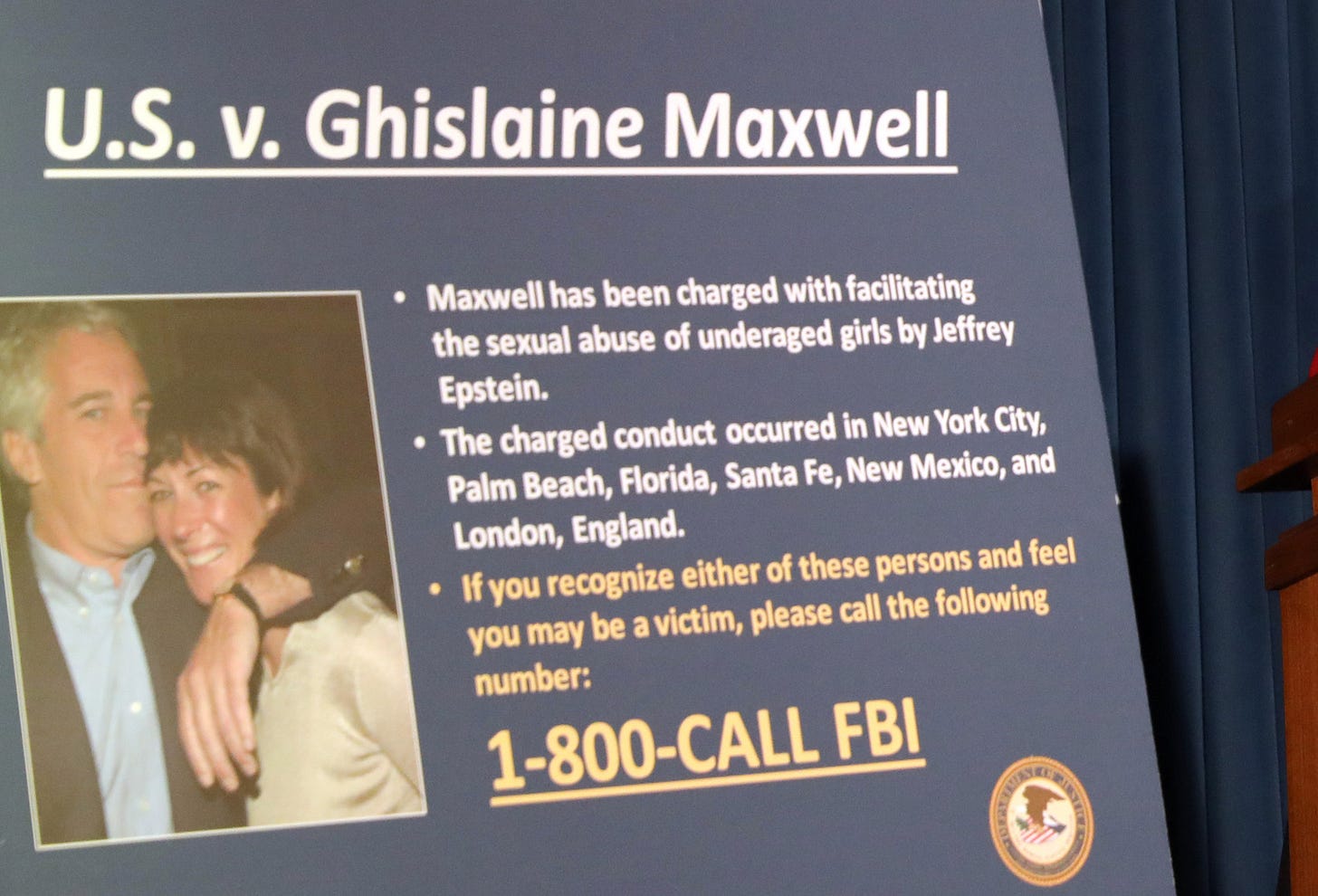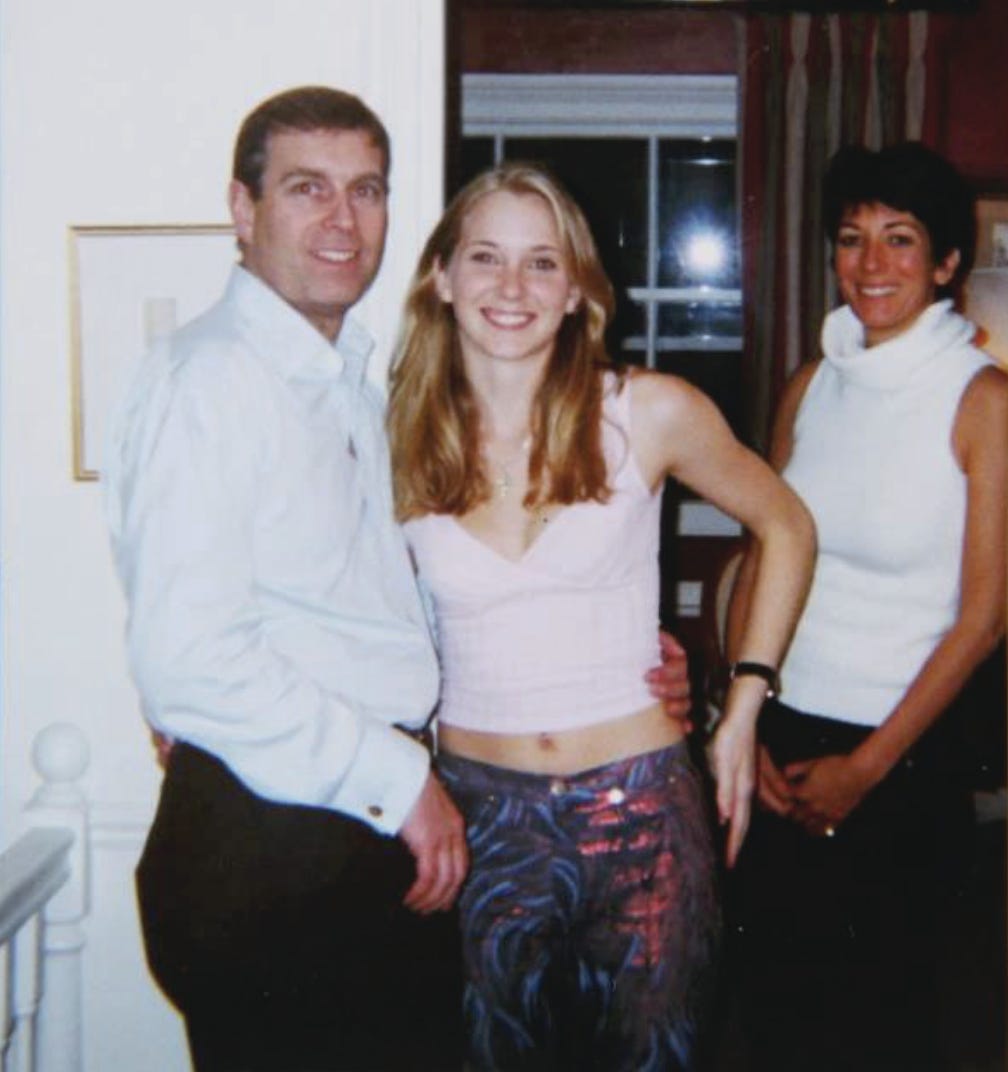The Maxwell transcripts: Trump's lawyer gives away the game
Todd Blanche gave the convicted sex trafficker ample opportunity to disparage victims—but became laser-focused on matters related to Trump.
Unpacking what’s wrong with Todd Blanche’s two-day interview of Ghislaine Maxwell requires a deep dive into hundreds of pages of transcripts and decades of institutional memory about all the players.
Support journalism that provides just that.
For two days of meandering questioning in Tallahassee, Fla., Donald Trump’s former criminal defense attorney turned Deputy Attorney General Todd Blanche gave convicted sex trafficker Ghislaine Maxwell ample opportunity to rehabilitate herself at the expense of victims like Virginia Giuffre.
Giuffre’s lawyer Sigrid McCawley, who represents hundreds of Jeffrey Epstein survivors, said that Maxwell “repeatedly and brazenly lied on the record to the government” in these transcripts.
“Maxwell ruined countless young lives with impunity for too long,” McCawley said in a statement. “Her effort to recreate history and distance herself from Epstein should not and will not be tolerated. The documents don’t lie, the multiple witnesses that testified against her at trial didn’t lie — the only person lying is Maxwell.”
Blanche’s approach took a dramatically different turn on a topic that affects his boss — like the letters to Jeffrey Epstein at the heart of Trump’s litigation against the Wall Street Journal.
“Bulls***”
On her first day of questioning, Maxwell asserted that she “never recruited a masseuse from Mar-a-Lago” to give massages to Epstein. Blanche did not follow up with any questions about the public record contradicting that denial. Giuffre testified in a deposition that Maxwell recruited her from Mar-a-Lago when she worked there, and Epstein’s house manager Juan Alessi told a jury at Maxwell’s trial that he met Giuffre at that private Trump club.
Maxwell revised her claim on the second day of questioning to say it was “not impossible” that she did recruit someone from Mar-a-Lago, without any prompting from Blanche.
That was far from the only swipe at Giuffre, who, having died by suicide earlier this year, was unable to respond.
In another exchange, Maxwell had carte blanche to ridicule what she described as Giuffre’s “bulls***” allegations against Prince Andrew, including a lengthy monologue disputing the authenticity of the infamous photograph of the royal and the then-teenager.
Calling the picture a “fake,” Maxwell gleefully described herself as “beyond excited” to discuss the topic: “I believe that this whole thing was manufactured, and I can point you to some potentially corroborating evidence of this.”
Maxwell claimed, without interruption or challenge by Blanche, that her London apartment was “the size of a nut,” the “old Victorian bath” where the sexual contact allegedly took place was too cramped, and the mirrored bathroom’s design would make it appear that “she was having sex with 5,000 generations of the Royal Family.”
Despite claiming on BBC Newsnight that the photograph may have been doctored, Andrew notably stopped short of making that claim in response to Giuffre’s sex-abuse lawsuit, which the royal settled for millions of dollars. In his answer to Giuffre’s complaint, Andrew’s legal team said he “lacks sufficient information to admit or deny” the photograph exists.
Blanche never pressed Maxwell on the disconnect.
A representative for Giuffre’s family did not immediately respond to an email requesting comment.
“Opened the door to hell”
Maxwell’s bitter and mocking swipes at Giuffre have a history. Giuffre’s defamation suit against Maxwell arguably sparked the series of events resulting in her convictions. The litigation created a vast public record mined by journalists about Maxwell’s relationship with Epstein, and prosecutors charged Maxwell with perjury based on her depositions in that case.
In a statement for Maxwell’s sentencing, Giuffre told her: “For me, and for so many others, you opened the door to hell.”
But Giuffre wasn’t the only victim whose account Maxwell revised.
In an unusual exchange, Maxwell started to discuss the allegations of one of her trial’s anonymous star witnesses: Jane, who testified that both Epstein and Maxwell sexually abused her when she was 14 years old. Blanche repeatedly tries to steer Maxwell away from the topic to avoid, in his words, a “he said, she said.”
Undeterred, Maxwell denies that she, or Epstein, met Jane until she was 16 years old, adding: “I knew about Jane, because I saw her come to the house. But I saw her with her mother.”
Blanche either did not know, or chose not to challenge Maxwell, on Jane’s testimony that she met Epstein and Maxwell at Michigan’s Interlochen summer camp in 1994, and Epstein’s flight records and pilot’s testimony confirmed that account.
“A picture of a naked woman of something”
On the other hand, Blanche displayed laser-like focus on Epstein’s 50th birthday book, the subject of a Wall Street Journal exposé reporting that Trump contributed a “bawdy” letter to it.
According to the report, Trump embedded a cryptic message in a drawing of a naked woman in a heavy marker with a squiggly “DONALD” mimicking her pubic hair, along with the send-off: “Happy Birthday — and may every day be another wonderful secret.”
By most accounts, the leather-bound notebook that Maxwell made for Epstein’s birthday had dozens of contributors, but Blanche only asks about one by name: Trump, who suggested the letter was a forgery and sued Rupert Murdoch over the Journal’s reporting on it.
Maxwell’s testimony here stopped short of an outright denial of its existence.
“TODD BLANCHE: Do you remember one way or the other whether President Trump submitted a letter for his 50th birthday?”
GHISLAINE MAXWELL: I do not remember.
TODD BLANCHE: And the article that references the letter talks about like a -- sounds like either a naked -- a picture of a naked woman or something like that. Do you have any recollection of that?
GHISLAINE MAXWELL: I do not.”
Blanche never asks about any other letter-writer by name in connection with the book, even though publicly reported contributors included financier Leon Black, lawyer Alan Dershowitz, former President Bill Clinton and others. (Blanche asks Maxwell about these and other prominent men on other topics, typically in passing.)
At the end of the two-day interview, Blanche even returns to the topic apropos of nothing and presses her on its physical details, including its materials, dimensions and binding. He also pressed her on the possible whereabouts of the original book, which Maxwell said was on Epstein’s bookcase in Manhattan.
The two-day interview abruptly ended after that.
It’s difficult to see how that subject would be so important to the Justice Department, the victims of Epstein and Maxwell’s crimes, or the general public to become the curtain-dropper of the marathon questioning. But the subject is one of intense interest to Trump, whom Blanche represented in his criminal cases.
After all, it’s the book at the heart of Trump’s active litigation against the Murdoch empire.
Note: The transcripts can be read here.





Of all the horrific things Trump and his sycophantic crew have done, this may rank at the top because of the utter callousness and disregard for the victims. I expect illegality. I expect a disdain for the proper role of the DOJ. I expect arrogance. I expect misogyny. We’ve seen before that Trump gives no thought to the innocent lives destroyed by his policies. I suppose enabling a convicted sex predator to desecrate her victims in a quid pro quo is just more of the same. Sickening.
Not really sure where this leaves us, other than far from where we need to be. Thanks, Adam.